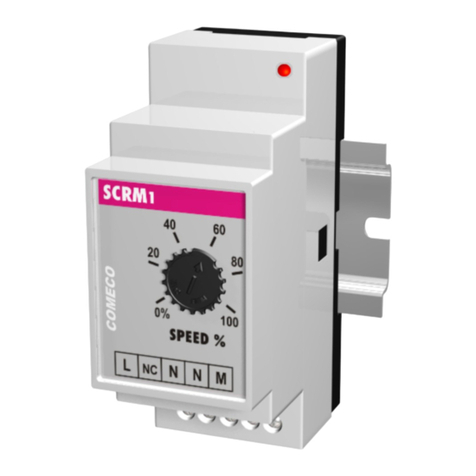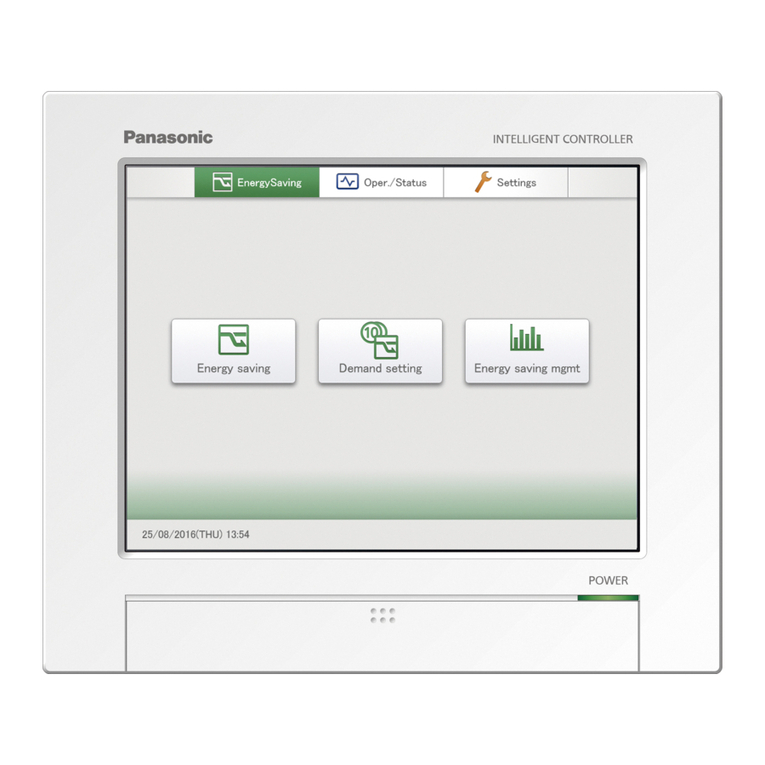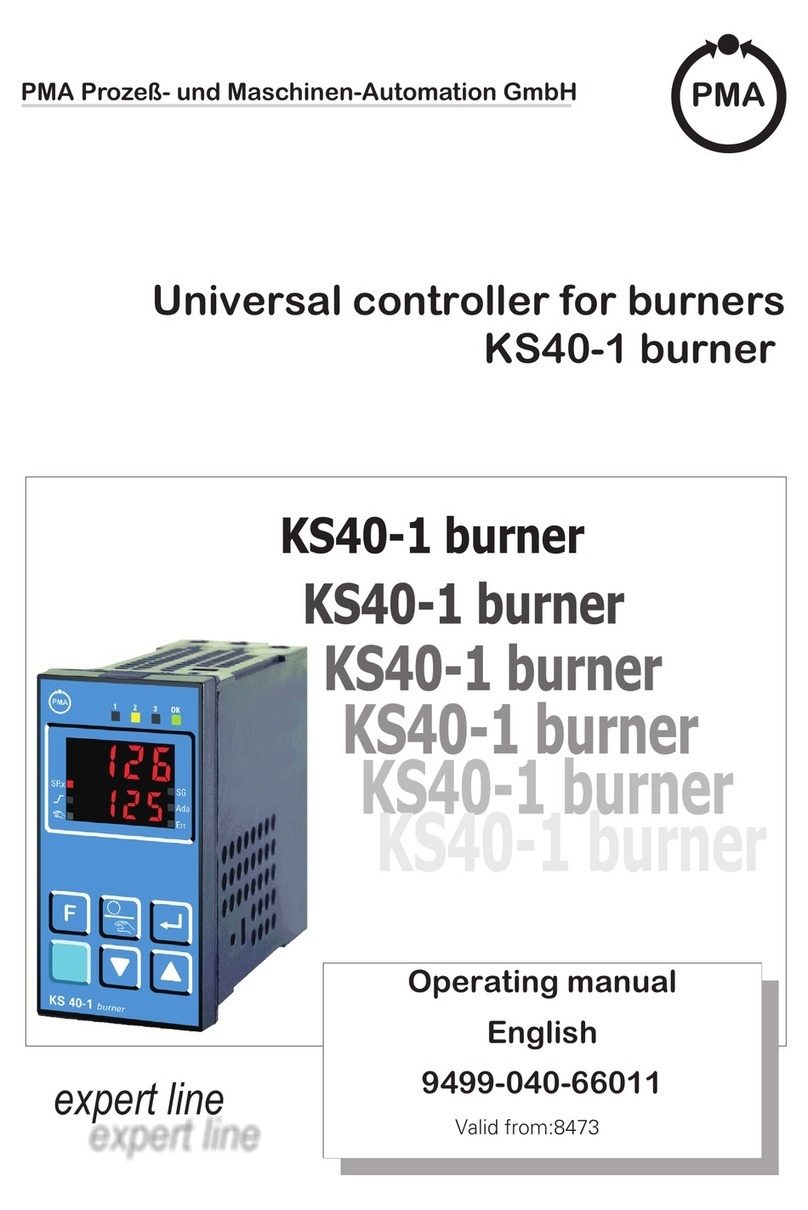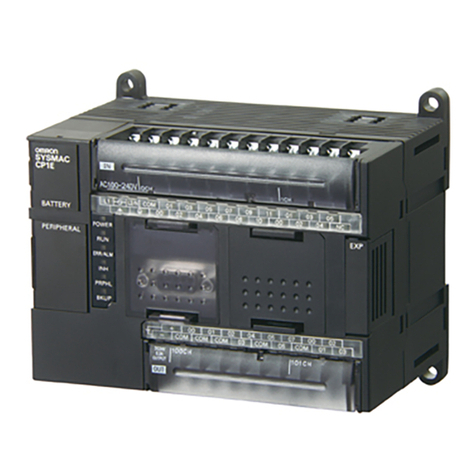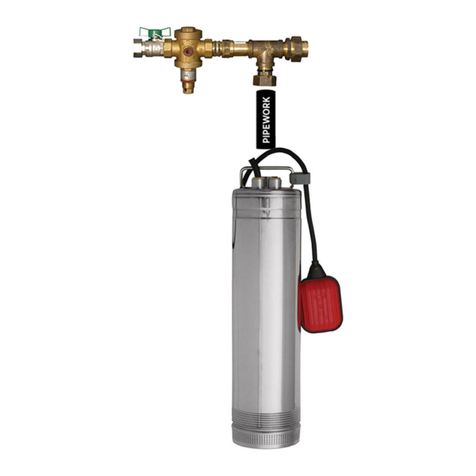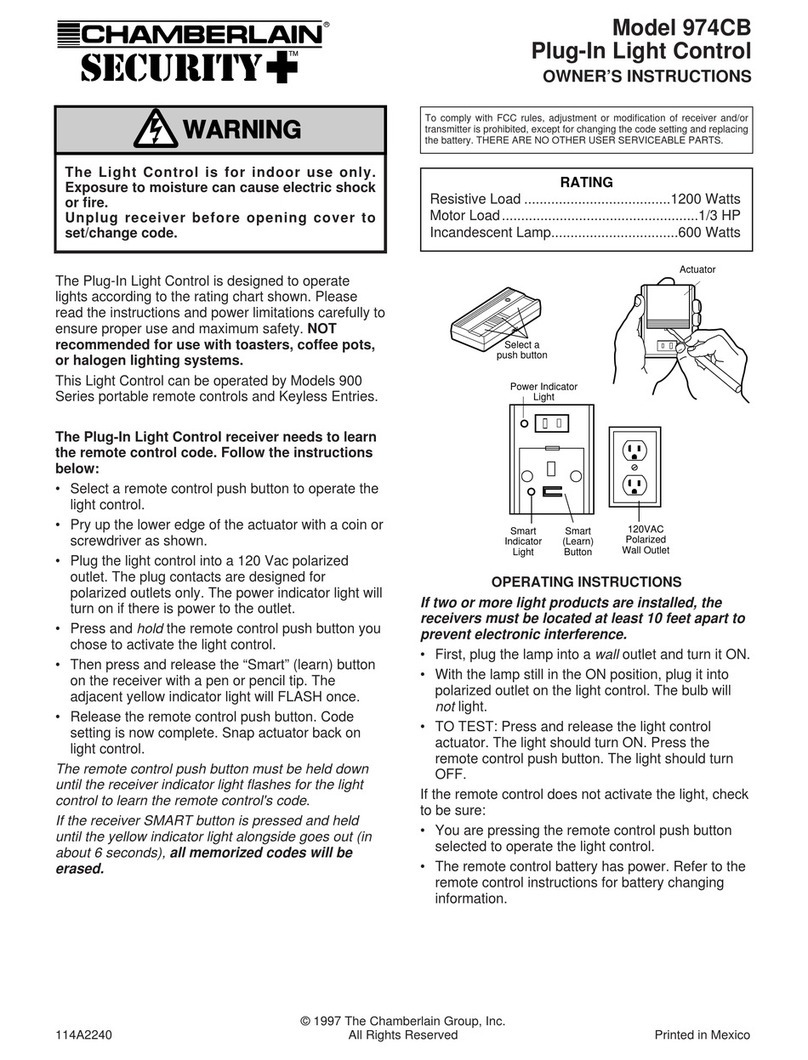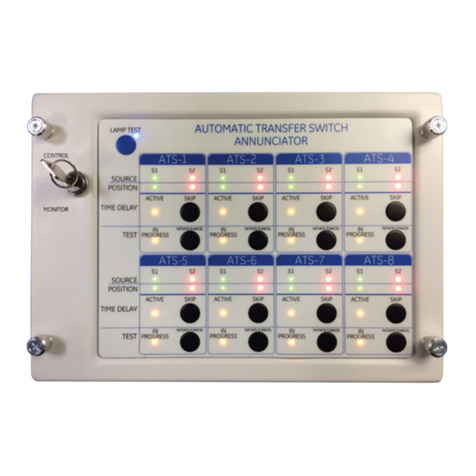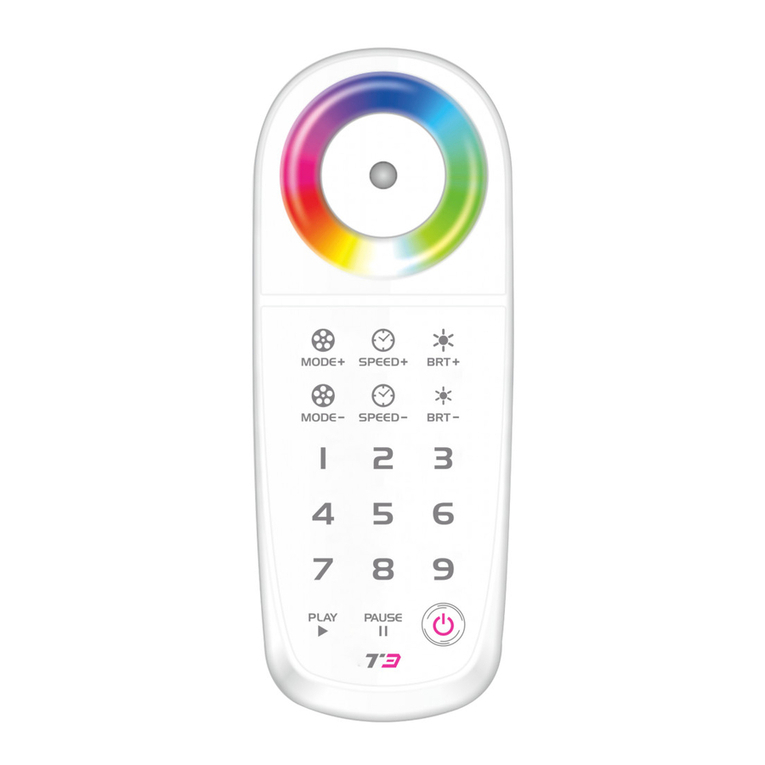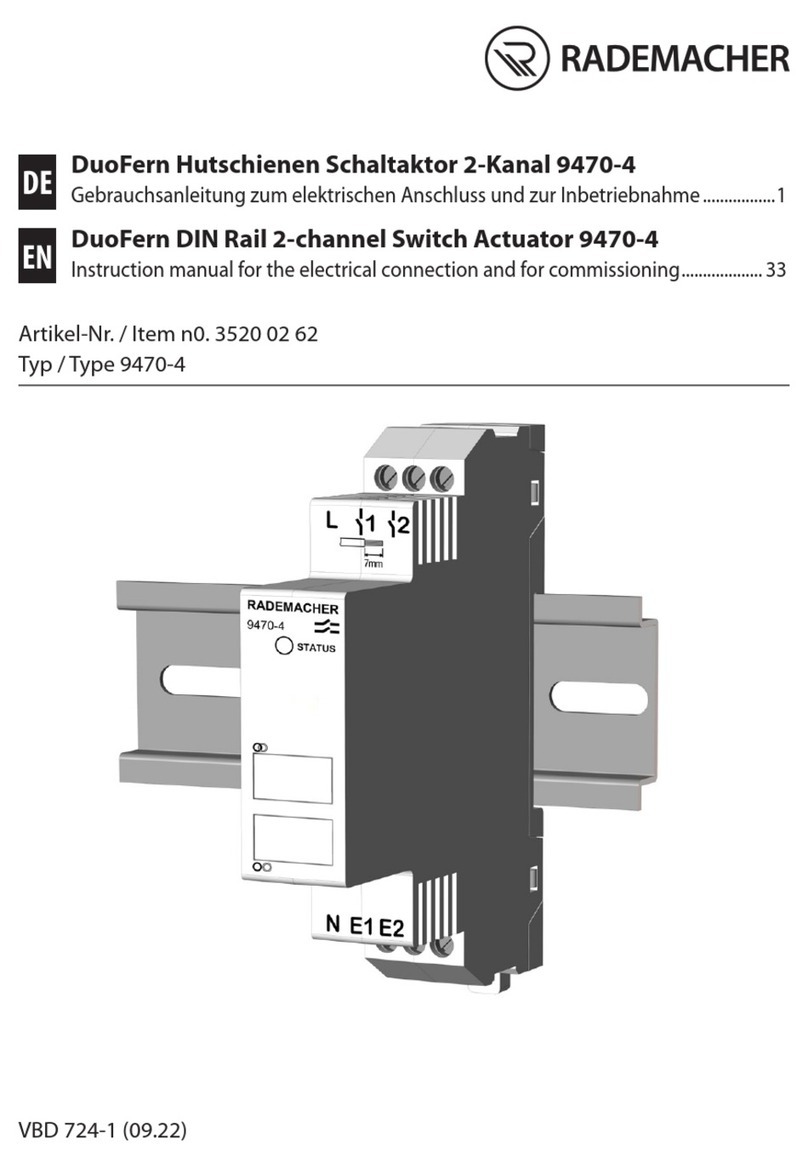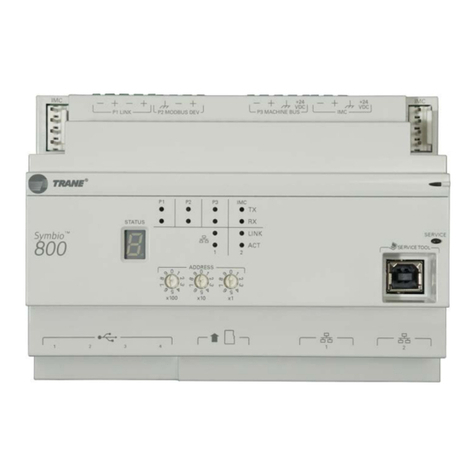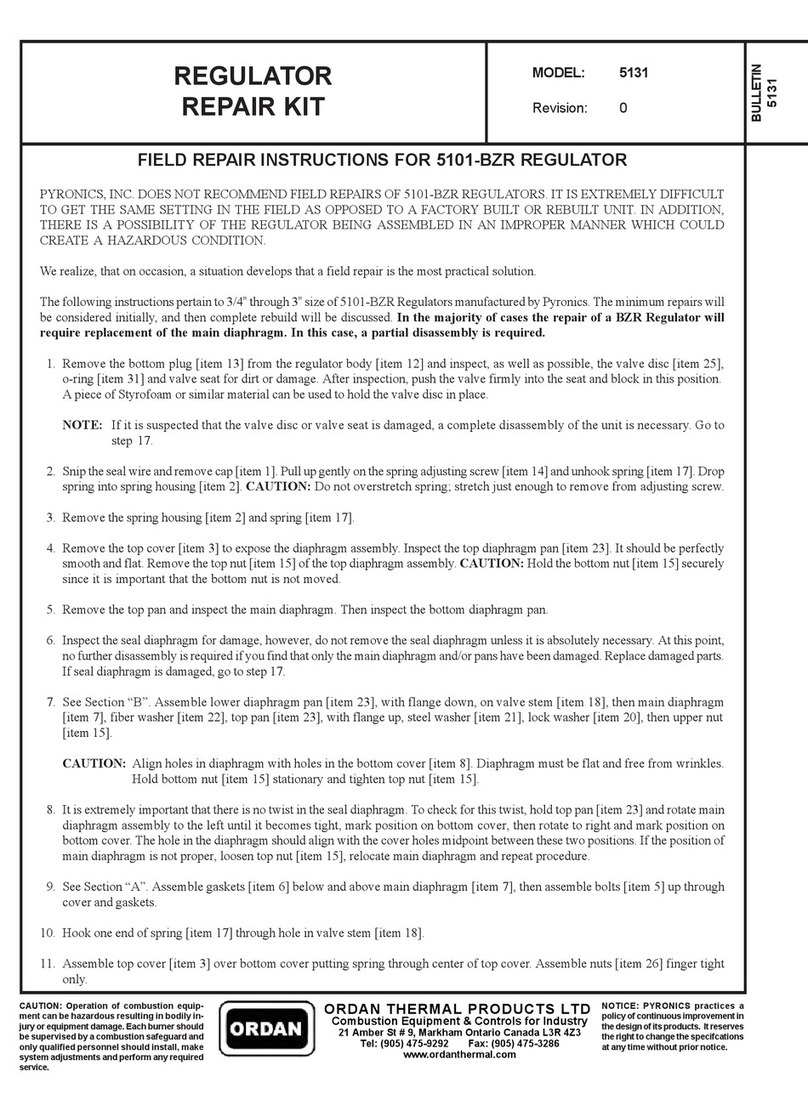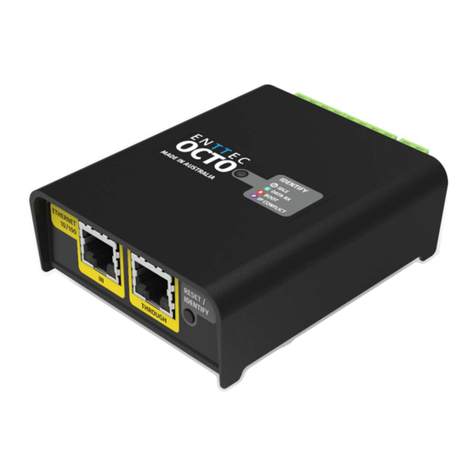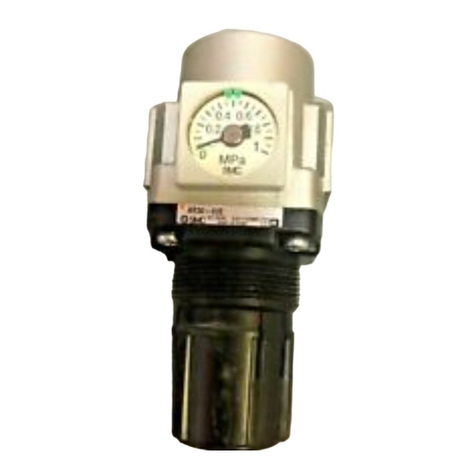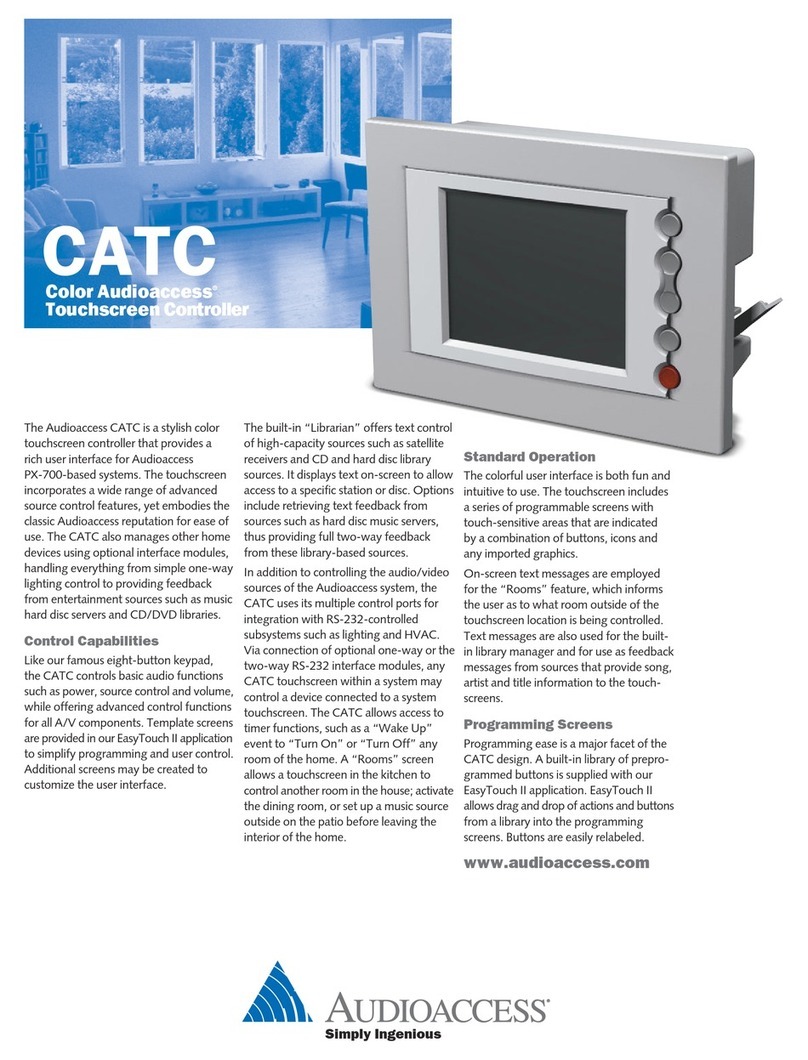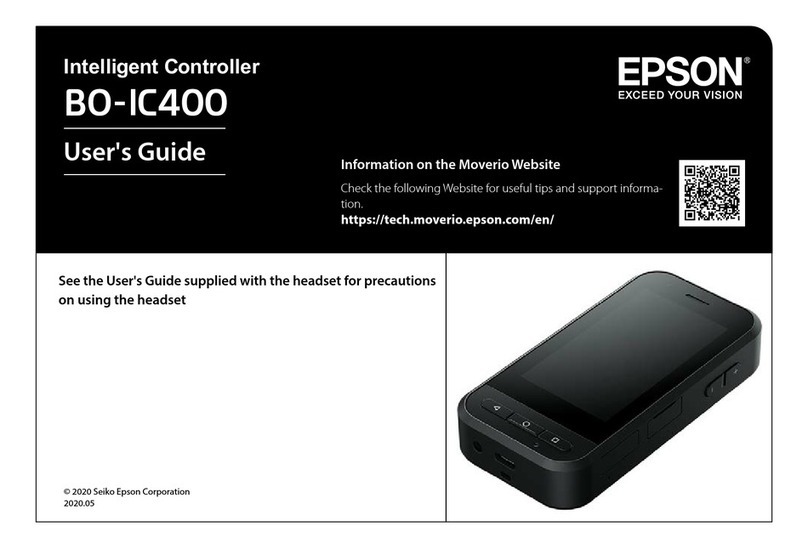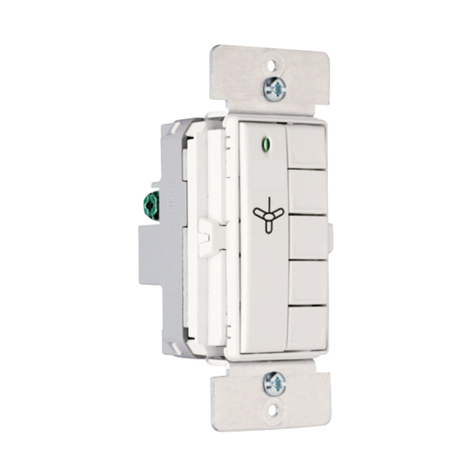DISAI EMKO ESM-4930 User manual

- 4 4 digits process set (SV) display
(TC, RTD, mV Z, V Z, mA Z)
- Dual or multi point calibration for ZVoltage / Current input
- Adaptation of PID coefficients to the system with Auto-tune and
Self-tune
- Manual/Automatic mode selection for control outputs
- Bumpless transfer
- Programmable heating, cooling and alarm functions for control
outputs
digits process (PV) and
- Universal process input
- Configurable ON/OFF, P, PI, PD ve PID control forms
ESM-4930 96x48 1/8 DIN Process Controller
ESM-4930 96 x 48 1/8 DIN
Universal Input PID Process Controller
Instruction Manual. ENG ESM-4930 02 V08 07/14

2
Instruction manual of ESM-4930 process controller consists of two main sections.
Explanation of these sections are below. Also, there are other sections which include order
information and technical specifications of the device. All titles and page numbers in instruction
manual are in “CONTENTS” section. User can reach to any title with section number.
Installation:
In this section, physical dimensions of the device, panel mounting, electrical wiring,
physical and electrical installation of the device to the system are explained.
Operation and Parameters:
In this section, user interface of the device, how to access to the parameters, description
of parameters are explained.
Also in these sections, there are warnings to prevent serious injury while doing the
physical and electrical mounting or using the device.
Explanation of the symbols which are used in these sections are given below.
This symbol is used to determine the dangerous situations as a result of an electric
shock. User must pay attention to these warnings definitely.
a
cThis symbol is used for safety warnings. User must pay attention to these
warnings.
This symbol is used to determine the important notes about functions and usage of
the device.
ABOUT INSTRUCTION MANUAL
i

1.PREFACE............................................................................................................................................
1.1 GENERAL SPECIFICATIONS
1.2 ORDERING INFORMATION
1.3 WARRANTY
1.4 MAINTENANCE
2.INSTALLATION....................................................................................................................................
2.1 GENERAL DESCRIPTION
2.2 DIMENSIONS
2.3 PANEL CUT-OUT
2.4 ENVIRONMENTAL RATINGS
2.5 PANEL MOUNTING
2.6 INSTALLATION MOUNTING CLAMP
2.7 REMOVING FROM THE PANEL
3.ELECTRICAL WIRINGS......................................................................................................................
3.1 TERMINAL LAYOUT AND CONNECTION INSTRUCTION
3.2 ELECTRICAL WIRING DIAGRAM
3.3 VIEW OF THE LABELS
3.4 CONNECTION OF DEVICE SUPPLY VOLTAGE INPUT
3.5 PROCESS INPUT CONNECTION
3.5.1 TC (THERMOCOUPLE) CONNECTION
3.5.2 RTD CONNECTION
3.5.3 PROCESS INPUT CONNECTION OF SERIAL TRANSMITTERS WITH CURRENT
OUTPUT (LOOP POWERED)
3.5.4 PROCESS INPUT CONNECTION OF 3-WIRE TRANSMITTERS WITH CURRENT
OUTPUT
3.5.5 CONNECTION OF TRANSMITTERS WITH VOLTAGE OUTPUT TO PROCESS
INPUT
3.6 GALVANIC ISOLATION TEST VALUES OF ESM-4930 PROCESS CONTROLLER
4.CONNECTION WIRINGS FOR OUTPUTS IN ESM-4930 PROCESS CONTROLLER......................
4.1 PROCESS OUTPUT (SSR DRIVER OUTPUT) CONNECTION
4.2 ALARM OUTPUT -1 RELAY CONNECTION
4.3 PROCESS OUTPUT OR ALARM OUTPUT -2 RELAY CONNECTION
5.DEFINITION OF FRONT PANEL AND ACCESSING TO THE PARAMETERS..................................
5.1 DEFINITION OF FRONT PANEL
5.2 OBSERVATION OF SOFTWARE REVISION ON THE BOTTOM DISPLAY WHEN POWER
IS ON
5.3 ADJUSTMENT OF PROCESS AND ALARM SET VALUES
5.4 EASY ACCESS DIAGRAM FOR PROGRAM PARAMETERS
5.5 ACCESSING TO THE TECHNICIAN MENU
5.6 CHANGING AND SAVING PARAMETERS
6.PARAMETERS.....................................................................................................................................
6.1 PROCESS / ALARM SET PARAMETERS
6.2 TECHNICIAN PARAMETERS
6.2.1 SELECTION OF PID TUNE AND OPERATION FORM
6.2.2 FUNCTION SELECTION FOR TOP AND BOTTOM DISPLAY
6.2.3 PROCESS INPUT TYPE AND RELEVANT PARAMETERS WITH PROCESS INPUT
6.2.4 PID CONFIGURATION PARAMETERS
6.2.5 PROCESS OUTPUT CONFIGURATION PARAMETERS
6.2.6 ALARM OUTPUT - 1 CONFIGURATION PARAMETERS
6.2.7 ALARM OUTPUT - 2 CONFIGURATION PARAMETERS
6.2.8 GENERAL PARAMETERS
6.2.9 TECHNICIAN PASSWORD
7.FAILURE MESSAGES IN ESM-4930 PROCESS CONTROLLERS...................................................
8.SPECIFICATIONS................................................................................................................................
9.OTHER INFORMATION.......................................................................................................................
CONTENTS
3
Page 5
Page 42
Page 20
Page 13
Page 8
Page 22
Page 65
Page 66
Page 67

4
Manufacturer Company Name : Emko Elektronik A.S..
Manufacturer Company Address: DOSAB, Karanfil Sokak, No:6, 16369 Bursa, Turkiye
The manufacturer hereby declares that the product conforms to the following
standards and conditions.
Product Name : Process Controller
Model Number : ESM-4930
Type Number : ESM-4930
Product Category : Electrical equipment for measurement, control and
laboratory use
Conforms to the following directives :
2006 / 95 / EC The Low Voltage Directive
2004 / 108 / EC The Electromagnetic Compatibility Directive
has been designed and manufactured to the following specifications :
EN 61000-6-4:2007 EMC Generic Emission Standard for the Industrial Environments
EN 61000-6-2:2005 EMC Generic Immunity Standard for the Industrial Environments
EN 61010-1:2001 Safety Requirements for electrical equipment for measurement, control
And laboratory use
When and Where Issued Authorized Signature
th
16 October 2009 Name : Serpil YAKIN
Bursa-TURKEY Position : Quality Manager
EU DECLARATION OF CONFORMITY

ESM series process controllers are designed for measuring and controlling temperature
and any process value.They can be used in many applications with their universal process input,
control outputs, selectable alarm functions.
Some application fields and an applications which they are used are below:
1.Preface
5
Application Fields Application
Glass PID Process Control
Plastic
Petro-Chemistry
Textile
Automative
Machine production industries
Alarm Out-1
(Relay Output)
Process Input
Power Supply
Input
Standard
1.1 General Specifications
ESM-4930
Standard
Standard
Heating-Cooling Function
ON/OFF, PID Operation
Auto-Tune, Self-Tune
Automatic/Manual Operation
Process Out
(SSR Driver Output)
Process Out or
Alarm Out-2
(Relay Output)
Standard
Universal Supply Input
100-240 VV, 50/60Hz
Low Voltage (optional)
Supply Input
24VV50/60Hz ,24VZ,
Universal Process Input
TC,RTD, ZVoltage/Current
Control Output
Alarm Output
Control Output

ESM-4930 (96x48 1/8 DIN)
Supply Voltage
100-240VV(- ) 50/60Hz15%;+10%
24 VV(- 50/60Hz 24VZ(-15%;+10%) 15%;+10%)
A
A
1
20
1
0
Configurable (Table-1) Table-1
Relay Output (5A@250VVat resistive load)
None
2
BC D E FG HI /
/
U V W Z/
/
Input Type
Output-1
Serial Communication
Scale
BC
E
HI
D
1.2 Ordering Information
1
Customer (Maximum 240VV(- )) 50/60Hz15%;+10%
9
6
01 Relay Output (5A@250VVat resistive load)
Output-2
FG
Output-3
02 SSR Driver Output (Maximum 17mA, 25VZ) cV Symbol means Vac,
Z Symbol means Vdc
W Symbol means Vac and Vdc
01 02
Table-1
41
42
43
44
45
0...50 mVZ
0...5 VZ
0...10 VZ
0...20 mAZ
4...20 mAZ
-1999,
-1999,
-1999,
-1999,
-1999,
9999
9999
9999
9999
9999
Input Type (ZVoltage and Current) ScaleBC
21
39
40
22
23
25
27
29
31
33
35
37
24
26
28
30
32
34
36
38
L ,Fe Const DIN43710
PT 100 , IEC751(ITS90)
PT 100 , IEC751(ITS90)
L ,Fe Const DIN43710
J ,Fe CuNi IEC584.1(ITS90)
K ,NiCr Ni IEC584.1(ITS90)
R ,Pt13%Rh Pt IEC584.1(ITS90)
S ,Pt10%Rh Pt IEC584.1(ITS90)
T ,Cu CuNi IEC584.1(ITS90)
B ,Pt30%Rh Pt6%Rh IEC584.1(ITS90)
E ,NiCr CuNi IEC584.1(ITS90)
N ,Nicrosil Nisil IEC584.1(ITS90)
C , (ITS90)
T ,Cu CuNi IEC584.1(ITS90)
B ,Pt30%Rh Pt6%Rh IEC584.1(ITS90)
E ,NiCr CuNi IEC584.1(ITS90)
N ,Nicrosil Nisil IEC584.1(ITS90)
C , (ITS90)
J ,Fe CuNi IEC584.1(ITS90)
K ,NiCr Ni IEC584.1(ITS90)
-100°C,850°C
-200°C,650°C
-199.9°C,650.0°C
-100.0°C,850.0°C
-200°C,900°C
-200°C,1300°C
0°C,1700°C
0°C,1700°C
-200°C,400°C
44°C,1800°C
-150°C,700°C
-200°C,1300°C
0°C,2300°C
-199.9°C,900.0°C
-199.9°C,999.9°C
-199.9°C,400.0°C
44.0°C,999.9°C
-150.0°C,700.0°C
-199.9°C,999.9°C
0.0°C,999.9°C
-148°F ,1562°F
-328°F,1202°F
-199.9°F,999.9°F
-148.0°F,999.9°F
-328°F,1652°F
-328°F,2372°F
32°F,3092°F
32°F,3092°F
-328°F,752°F
111°F,3272°F
-238°F,1292°F
-328°F,2372°F
32°F,3261°F
-199.9°F,999.9°F
-199.9°F,999.9°F
-199.9°F,752.0°F
111.0°F,999.9°F
-199.9°F,999.9°F
-199.9°F,999.9°F
32.0°F,999.9°F
Input Type(TC)
Input Type(RTD)
Scale(°C)
Scale(°C)
Scale(°F)
Scale(°F)
BC
BC
All order information of ESM-4930 are
given on the table at left. User may form
appropriate device configuration from
information and codes that at the table and
convert it to the ordering codes.
Firstly, supply voltage then other
specifications must be determined. Please
fill the order code blanks according to your
needs.
Please contact us, if your needs are
out of the standards.
0

7
1.3 Warranty
EMKO Elektronik warrants that the equipment delivered is free from defects in material and
workmanship. This warranty is provided for a period of two years. The warranty period starts from
the delivery date. This warranty is in force if duty and responsibilities which are determined in
warranty document and instruction manual performs by the customer completely.
1.4 Maintenance
Repairs should only be performed by trained and specialized personnel. Cut power to the device
before accessing internal parts.
Do not clean the case with hydrocarbon-based solvents (Petrol, Trichlorethylene etc.). Use of
these solvents can reduce the mechanical reliability of the device. Use a cloth dampened in ethyl
alcohol or water to clean the external plastic case.

8
In package ,
- One piece unit
- Two pieces mounting clamps
- One piece instruction manual
A visual inspection of this product for possible damage occured during shipment is
recommended before installation. It is your responsibility to ensure that qualified
mechanical and electrical technicians install this product.
If there is danger of serious accident resulting from a failure or defect in this unit, power
off the system and separate the electrical connection of the device from the system.
The unit is normally supplied without a power switch or a fuse. Use power switch and fuse
as required.
Be sure to use the rated power supply voltage to protect the unit against damage and to
prevent failure.
Keep the power off until all of the wiring is completed so that electric shock and trouble
with the unit can be prevented.
Never attempt to disassemble, modify or repair this unit. Tampering with the unit may
results in malfunction, electric shock or fire.
Do not use the unit in combustible or explosive gaseous atmospheres.
During the equipment is putted in hole on the metal panel while mechanical installation
some metal burrs can cause injury on hands, you must be careful.
Montage of the product on a system must be done with it’s fixing clamps. Do not do the
montage of the device with inappropriate fixing clamp. Be sure that device will not fall
while doing the montage.
It is your responsibility if this equipment is used in a manner not specified in this
instruction manual.
Before beginning installation of this product, please read the instruction
manual and warnings below carefully.
2.Installation
c

2.1 General Description
2.2 Dimensions
9
Product Label
Terminal protection cover
Mounting Clamp
Front Panel
IP65 protection
NEMA 4X
Panel surface
(maximum thickness 15mm / 0.59 inch)
Maximum 15mm / 0.59 inch
48mm/ 1.89 inch
96mm / 3.78 inch
76mm / 2.99 inch
10.5 ± 1 mm /0.41 inch
°C
°F
VV
PO
AO1
AO2
MA
AT
PSET
ASET1
ASET2
Process Controller ESM - 4930
SET
A/MAT
P

2.3 Panel Cut-Out
10
92mm / 3.62 inch
129 mm / 5.08 inch (min)
65 mm / 2.56 inch (min)
46 mm / 1.81 inch (min)

During installation into a metal panel, care should be taken to avoid injury from
metal burrs which might be present. The equipment can loosen from vibration
and become dislodged if installation parts are not properly tightened. These
precautions for the safety of the person who does the panel mounting.
2.5 Panel Mounting
c
11
Operating Temperature : 0 to 50 °C
Max. Operating Humidity : 90% Rh (non-condensing)
Altitude : Up to 2000m.
Operating Conditions
Forbidden Conditions:
Corrosive atmosphere
Explosive atmosphere
Home applications (The unit is only for industrial applications)
2.4 Environmental Ratings
c
1-Before mounting the device in
your panel, make sure that the cut-
out is of the right size.
2-Check front panel gasket
position
3-Insert the device through the
cut-out. If the mounting clamps are
on the unit, put out them before
inserting the unit to the panel.
1
2
3
During installation into a metal panel, care should be taken to avoid injury from
metal burrs which might be present. The equipment can loosen from vibration
and become dislodged if installation parts are not properly tightened. These
precautions for the safety of the person who does the panel mounting.
2.5 Panel Mounting
c
11
Operating Temperature : 0 to 50 °C
Max. Operating Humidity : 90% Rh (non-condensing)
Altitude : Up to 2000m.
Operating Conditions
Forbidden Conditions:
Corrosive atmosphere
Explosive atmosphere
Home applications (The unit is only for industrial applications)
2.4 Environmental Ratings
c
1-Before mounting the device in
your panel, make sure that the cut-
out is of the right size.
2-Check front panel gasket
position
3-Insert the device through the
cut-out. If the mounting clamps are
on the unit, put out them before
inserting the unit to the panel.
1
2
3

2.6 Installation Mounting Clamp
2.7 Removing from the Panel
12
Before starting to remove the unit from panel, power off the unit and the
related system.
Montage of the unit to a system must be done with it’s own fixing clamps. Do
not do the montage of the device with inappropriate fixing clamps. Be sure
that device will not fall while doing the montage.
c
c
1-Loosen the screws
2-Pull mounting clamps from top
and bottom fixing sockets.
3-Pull the unit through the front
side of the panel
The unit is designed for panel
mounting.
1-Insert the unit in the panel cut-
out from the front side.
2- Insert the mounting clamps to
the holes that located top and
bottom sides of device and screw
up the fixing screws until the unit
completely immobile within the
panel
12
1
2
3

3.Electrical Wirings
3.1 Terminal Layout and Connection Instructions
13
You must ensure that the device is correctly configured for your application.
Incorrect configuration could result in damage to the process being
controlled, and/or personal injury. It is your responsibility, as the installer, to
ensure that the configuration is correct.
Parameters of the device has factory default values. These parameters must
be set according to the system’s needs.
Only qualified personnel and technicians should work on this equipment.
This equipment contains internal circuits with voltage dangerous to human
life. There is severe danger for human life in the case of unauthorized
intervention.
Be sure to use the rated power supply voltage to protect the unit against
damage and to prevent failure.
Keep the power off until all of the wiring is completed so that electric shock
and trouble with the unit can be prevented.
c
c
c
c
6 mm / 0.236 inch
Wire Size:
18AWG / 1 mm²
Solid /Stranded
24 screws
terminal M3
Empty terminals
Torque 0.5 Nm
Screw driver
0.8x3mm
1
13
2
14
3
15
4
16
5
17
6
18
7
19
8
20
9
21
10
22
11
23
12
24
0.5 Nm

3.2 Electrical Wiring Diagram
Electrical wiring of the device must be the same as ‘Electrical Wiring Diagram’
below to prevent damage to the process being controlled and personnel injury.
c
14
Process input is in CAT II class
ii
1 2 345678 9 10 11 12
13 14 15 16 17 18 19 20 21 22 23 24
P/N : ESM-4930
TC
a
cCAT II
Y
100-240V V(-15%;+10%) 50/60Hz - 6VA
24 V V(-15%;+10%) 50/60Hz - 6VA
24V Z(-15%;+10%) - 6W
0 to 20mA Z
Max. 17mA, 25VZ
Pt-100
(ALARM OUT-2)
PROCESS OUT
NO CNC
5A@250VVALARM OUT-1
NO CNC
5A@250VV
Universal
Process Input
(TC, RTD,ZVoltage / Current)
Sensor or Transmitter
Supply Voltage Standard Process Output
SSR Driver Output
Process Output or
Alarm Output-2 Relay Alarm Output-1
Relay
Supply Voltage Input
(It must be determined in order)
0 to 50mV Z
0 to 10V Z
24V Z±10%
Max 50mA

15
3.3 View of the Labels
13
1
14
2
15
3
16
4
17
5
18
6
19
7
20
8
21
9
22
10
23
N
11
24
L
12
100 to 240 VV
50/60Hz - 6VA
TC
Pt-100
0 to 20mAZ
0 to 50mVZ
0 to 10VZ
NCNO C
5A@250VV
(ALARM OUT-2)
PROCESS OUT
NCNO C
5A@250VV
ALARM OUT-1
PROCESS OUT
SSR DRIVER OUT.
Max. 17mA, 25VZ
P/N : ESM-4930
CAT II
Y
ca
m
Max.50mA
24 VZ±10%
0 T 50 IP65/IP20

3.4 Connection of Device Supply Voltage Input
16
c
c
c
Universal Supply
Voltage Connection
100 - 240 VV
(-15%;+10%) 50/60Hz
Supply Voltage
23
N L
24
N 1
ote-
Y
Power
Supply
Switch
c
a
External
Fuse
(1 A VT)
Low Voltage 24 VW
Supply Voltage Input
24VV(-15%;+10%) 50/60Hz
or 24VZ(-15%;+10%)
23
L
24
Y
c
a
External
Fuse
(24V V: 1 A VT)
(24V Z: 1 A ZT)
Note-2
N
Supply Voltage
Note-1
Power
Supply
Switch
Note-3
Note-3
Note-1 :There is an internal 33R W fusible flameproof resistor in 100-240 VV50/60Hz supply
voltage input
There is an internal 4R7 W fusible flameproof resistor in 24VV50/60Hz , 24VZsupply voltage
input
Note-2 : “L” is ( + ) ,” N” is ( - ) for 24V Z supply voltage
Note-3 : External fuse is recommended.
Make sure that the power supply voltage is the same indicated on the
instrument.
Switch on the power supply only after that all the electrical connections have
been completed.
Supply voltage range must be determined in order. While installing the unit,
supply voltage range must be controlled and appropriate supply voltage must
be applied to the unit. Controlling prevents damages in unit and system and
possible accidents as a result of incorrect supply voltage.
There is no power supply switch on the device. So a power supply switch must
be added to the supply voltage input. In accordance with the safety regulations,
the power supply switch shall bring the identification of the relevant
instrument.Power supply switch shall be easily accessible by the user.
Power switch must be two poled for seperating phase and neutral. On/Off
condition of power switch is very important in electrical connection. On/Off
condition of power switch must be signed for preventing the wrong connection.
If an external fuse is used, it must be on phase connection in Vsupply input.
If an external fuse is used, it must be on (+) line connection in Zsupply input.
The instrument is protected with an internal fuse (Please refer to Note1 for
information). In case of failure it is suggested to return the instrument to the
manufacturer for repair.

17
3.5 Process Input Connection
3.5.2 RTD Connection
Note 1 : In 3-wire system, use always cables of the same diameter (min 1mm²) Always use
wires of the same gauge and type whether a 2-wire or 3-wire system.
Note 2 : Install a jumper between terminals 2 and 3 when using a 2-wire RTD.
Note 3 : If the distance is longer than 10 meters, use 3-wire system
3-wire Pt-100 connection
(with line compensation)
(Max. Line impedance is 10 W)
2-wire Pt-100 connection
(without line compensation)
1 12 23 3
Note 1 Note 2
3.5.1 TC (Thermocouple) Connection
1 2 3
TC Connect the wires with the polarity as shown in the
figure left.
Always use compensation wire corresponding to the thermocouple used. If
present, the shield must be connected to a proper ground.
ii
Input resistance is greater than 10M W
ii
Input resistance is greater than 10M W
ii
Pt-100 Pt-100

3.5.4 Process Input Connection of 3-wire Transmitters with Current Output
Transmitter connection by using supply
voltage on the device
Transmitter connection by using external supply
voltage source.
Transmitter Transmitter
External
Power
Supply
Note-1
mAZ
PV PV
1 1
3 3
4 4
3.5.3 Process Input Connection of Serial Transmitters with Current Output (Loop
Powered)
Transmitter connection by using supply
voltage on the device
Transmitter connection by using external supply
voltage source.
Transmitter Transmitter
External
Power
Supply
Note-1
mAZmAZ
PV PV
1 1
3 3
4 4
Note 1 : External power supply must be selected according to supply voltage range and
required current for transmitter.
Note-1 : External power supply must be selected according to supply voltage range and
required current for transmitter.
18
Input resistance is 2R7 W.
ii
Input resistance is 2R7 W.
ii
mAZ
24 VZ
Max. 50mA
±10% 24 VZ
Max. 50mA
±10%
24 VZ
Max. 50mA
±10%
24 VZ
Max. 50mA
±10%

19
3.6 Galvanic Isolation Test Values of ESM-4930 Process Controller
Supply Input 23
24 Ground 1
Process Output
(SSR Driver Output)
11
12
Process Output or
Alarm Output-2 Relay
13
14
2000VV( For ESM-4930.1.....)
500VV( For ESM-4930.2.....)
Analogue
Inputs
2
3
Alarm Output-1 Relay
3.5.5 Connection of Transmitters with Voltage Output to Process Input
2000VV
2000VV
2000VV
2000VV
2000VV
2000VV
Transmitter connection by using supply
voltage on the device
Transmitter connection by using external supply
voltage source.
Transmitter Transmitter
External
Power
Supply
Note-1
mV, VZmV, VZ
PV PV
1 1
2 2
4 4
Note-1 : External power supply must be selected according to supply voltage range and
required current for transmitter.
Input resistance is greater than 10M W for 0...50mV Z
Input resistance is greater than 43K W for 0...10V Z
ii
24V ZVoltage
Output 4
2000V V
15
16
17
18
24 VZ
Max. 50mA
±10% 24 VZ
Max. 50mA
±10%
11
12
13
14
15
16
17
18
2
3
4

4. Connection Wirings for Outputs in ESM-4930 Process Controller
4.1 Process Output ( SSR Driver Output ) Connection
4.2 Alarm Output-1 Relay Connection
20
Fuses must be selected according to the applications.
c
Fuses must be selected according to the applications.
c
12
L N
11
c
Max. 25VZ,
Max. 17mA
Device Last Control
Element
(SSR)
Fuse
Load
18
16
L N
c
17
C
NC
NO
Device
5AVT Fuse
Last Control Element
(Contactor)
Fuse
Load
Table of contents
